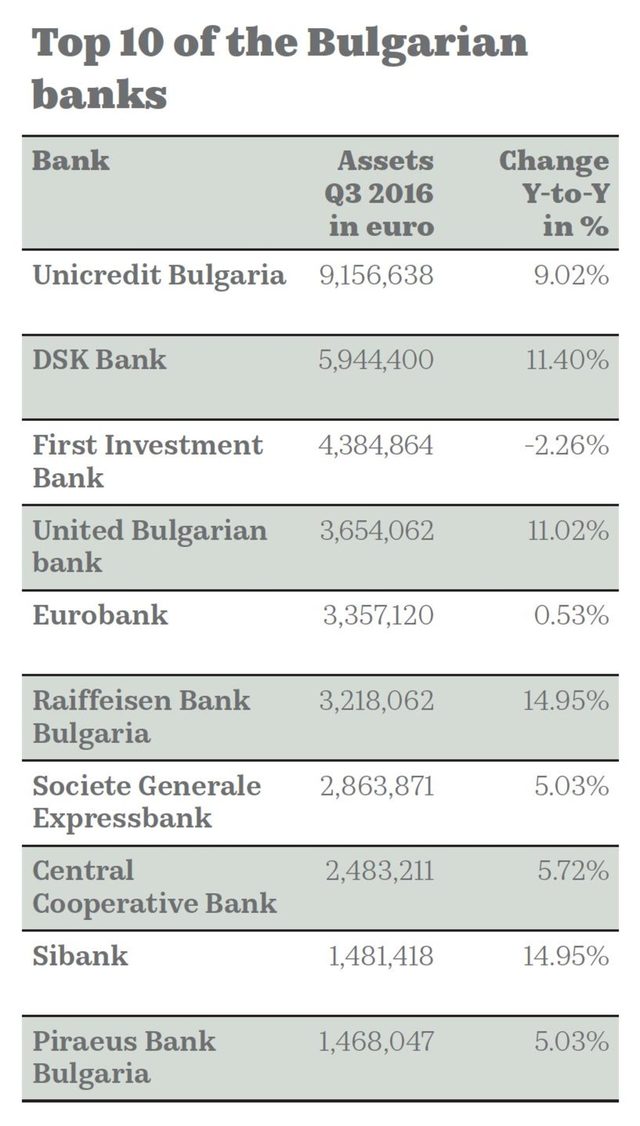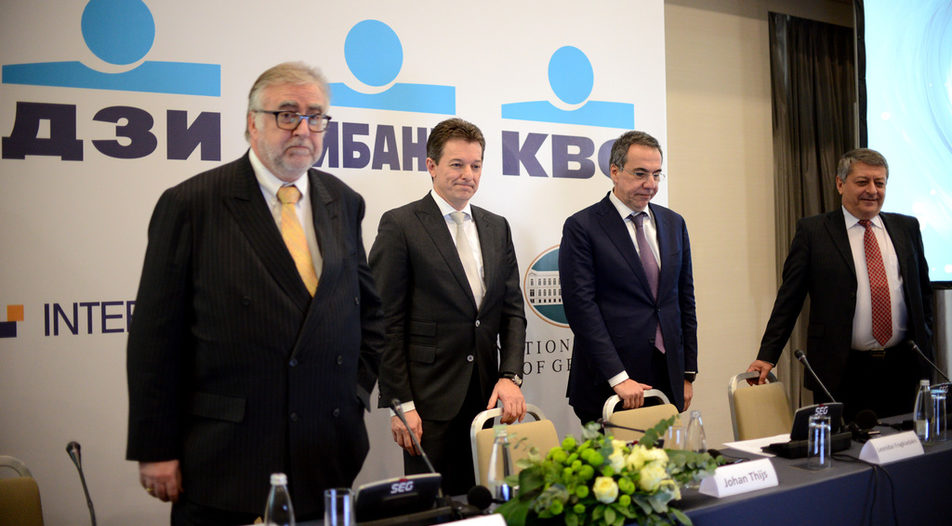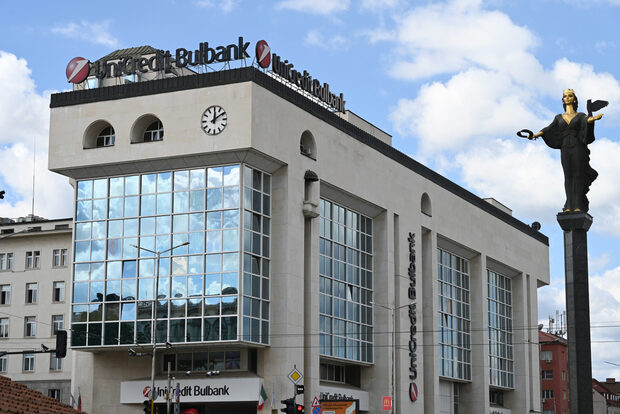With a 610 million euro price tag, the acquisition of United Bulgarian Bank (UBB), a subsidiary of the National Bank of Greece (NBG), by Belgium's KBC became a benchmark transaction not only for Bulgaria but also for the region. The deal, which was closed in the final days of 2016 and is expected to be finalized in the second quarter of 2017, ends the Greek era in the Bulgarian banking sector. Once equal to almost a quarter of the Bulgarian market, the Greek share will shrink to less than 10% as a result of the deal.
The sale of UBB was expected for quite a long time. Following 16 years of ownership NBG was forced by its creditors to give away its subsidiary and use the proceeds of the sale for debt restructuring.
The name of the preferred buyer, the Belgium-based financial group KBC, was a public secret since the procedure was launched in late summer. The second bidder was the Hungarian OTP Group, which controls the biggest Bulgarian lender DSK Bank.
However, when the announcement came out at the very end of 2016, it surpassed all expectations. The deal became the most expensive acquisition in the history of the Bulgarian financial market. In 2000, Bulbank was privatized and Italian banking group Unicredit paid for it 360 mn euro, while three years later DSK was sold to OTP Group for 311.1 mn euro. The price paid for UBB is also an indicator for the recovery of the Bulgarian economy and the expectations for stable profits in the Bulgarian banking sector.
High expectations
The official announcement of the deal makes it clear that the sale includes not only the bank but also its related businesses in leasing, factoring and asset management. Sources familiar with the transaction revealed to Capital weekly that the negotiated price for 99.99% of the bank is 580 mn euros. Тhe additional 30 mn euro are paid for Interlease and the rest from NBG's portfolio.
The price is net of the recently paid dividend of 130 mn euro and the ongoing further net profit distribution of 53 mn euro. The buyer takes into account a negative adjustment for 81 mn euro in the book value of the bank's assets, identified during the due diligence process.
The purchase price is equal to more than 80% of UBB's balance sheet capital of 685 mn euro at the end of September, one of the highest valuations in the European banking sector.
With its assets of 3.6 billion euro UBB is the fourth-largest lender in Bulgaria. Its market share is 9% in customer loans and 8% in deposits. The share of non-performing loans in the bank's portfolio is higher than the market average of 28%, but their coverage with provisions is 61% and a vast portion of the debt is 8+ years old. Even with such a burden UBB's return on assets is 10% which is considered satisfactory by the buyer whose own ROE is 17%.
Other valuable assets are more than 1 million retail customers and the distribution network of 190 branches, 691 ATMs plus 2600 employees.
Interlease positions are also very attractive for KBC. The company is the third-largest provider of leasing services in Bulgaria with market share of 13%. With this acquisition the Belgian group enters a sector with a significant growth potential.
Achieving leading positions in the financial area is a principle for KBC whose managers say that they have learned the lesson from the aggressive expansion in the past. "Together with DZI Insurance, UBB-CIBANK will make KBC the true reference bank-insurance group in Bulgaria, to the benefit of customers, employees and all stakeholders", said Johan Thijs, KBC Group CEO.
After the financial crisis of 2008, which KBC survived thanks to state aid, the group is now more focused on its strategic divisions - banks and insurers, especially those who are leaders on its core markets. Bulgaria is one of them since 2009, two years after the acquisition of Cibank and insurer DZI. Currently, Cibank holds 9th position with assets of 1.5 billion euro and loan and deposit portfolios of 0.8 billion euros. In the meantime DZI is active on both life and non-life insurance segments with market shares of 12% and 11%, respectively.
Creating a big player
In fact the acquisition of UBB is KBC's first purchase after the financial crisis. The aim of the transaction is to create the largest banking and insurance group in Bulgaria by bringing together UBB, Cibank and DZI. The operation will create the 3rd largest bank in the country with almost 300 branches nationwide, while the aggregated customer base of the conglomerate will exceed 1.4 million people. According to estimations of KBC's management the potential synergies will reach approximately 20 mn euro in 2023.
"The acquisition of UBB will allow us to immediately boost our market share in both lending and deposits. We will substantially strengthen and solidify our current position on the Bulgarian market and be able to play a major role in supporting the local economy," stated Peter Andronov, CEO of CIBANK and KBC Country Manager.
The deal is expected to be closed in the second quarter of 2017 following regulatory approval by the Bulgarian National Bank and the Financial Supervision Commission of the Republic of Bulgaria. KBC should obtain an authorisation by the National Bank of Belgium, the European Central Bank and the anti-trust authorities as well.

Gergana Mihaylova is financial reporter with Capital Weekly
Who is who
UBB was established in 1992 through the merger of 22 Bulgarian regional commercial banks and has been part of the financial group of the National Bank of Greece (NBG) since 2000. UBB is Bulgaria's fourth-largest banking group by total assets (3.7 billion euro) with market share of 8% as at the end of September 2016. UBB has approximately 900,000 retail customers with market share of 11% in retail loans. UBB also has a strong presence in the corporate banking market with a share of 8% in corporate loans.The bank has a robust capital position (CET1 ratio of 27.8% as at the end of the third quarter of 2016) and reported the highest CET1 ratio among large banks in both the base and adverse stress test scenarios during the recent 2016 Asset Quality Review/Stress Tests. Its cost/income ratio amounted to 47% in 2015, putting it among the most cost-efficient banks in the sector.
KBC Group was formed in 1998 after the merger of two Belgian banks (Kredietbank and CERA Bank) and a Belgian insurance company (ABB Insurance). The group serves 10 million customers on its core markets in Belgium, the Czech Republic, Slovakia, Hungary and Bulgaria. KBC has a network of 1 560 bank branches. As of 30 September 2016 its balance sheet assets are 266 billion euro. For the period its net profit is 1.7 billion euro. The equity market capitalization is 24.6 billion euro. The group has high ratings: A- (Fitch), A1 (Moody's) and A (Standard & Poor's). Its main shareholders are Cera (co-operative investment company), KBC Ancora Group, the Belgian farmers' association (MRBB) and a group of industrialist families which own roughly 40% and act as a syndicate.
With a 610 million euro price tag, the acquisition of United Bulgarian Bank (UBB), a subsidiary of the National Bank of Greece (NBG), by Belgium's KBC became a benchmark transaction not only for Bulgaria but also for the region. The deal, which was closed in the final days of 2016 and is expected to be finalized in the second quarter of 2017, ends the Greek era in the Bulgarian banking sector. Once equal to almost a quarter of the Bulgarian market, the Greek share will shrink to less than 10% as a result of the deal.
The sale of UBB was expected for quite a long time. Following 16 years of ownership NBG was forced by its creditors to give away its subsidiary and use the proceeds of the sale for debt restructuring.










